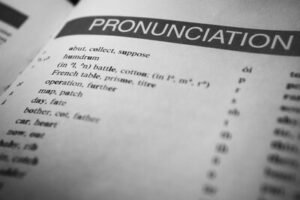The intricate evolution of the English spelling system

Have you ever wondered why English has such a complex spelling? You can find words that have the same set of letters together, but when you hear them out loud, they do not sound alike. A great example of this are the words through, though, thorough, and thought; which all have the same letters – the “ou” cluster – but are pronounced completely different.
For the natives, it may seem obvious, but foreign learners have a hard time with these ones. This is due to something called “transparency of a language”, the relationship between what is written, i.e. graphemes aka the letters; and what is said i.e. phonemes aka the sounds of that language. If a language’s graphemes and phonemes coincide all the time, we have a transparent language. The less the writing and the pronunciation correspond, the less transparent it will be. English, for this reason, is considered an opaque language.

Basically, transparent languages have strict sound-letter ties, while opaque languages can have diverse sounds linked to the same letters. There are certainly languages found in the middle, not every language can be described as totally transparent or opaque, it is more of a graded system of classification.
English today has reached all the imaginable nooks on our planet; from the UK to Australia, going through nearly every country possible, English is spoken in a way or another – though that extension has made it a very changing and diverse language. However, this language has its origins in the island of Great Britain, where it was born and took its first steps to become what it is in the present.
Vikings, Romans, Celts… They all arrived in England and, besides leaving part of their culture, they left their influences on the language too. Keep reading if you want to learn what they all entailed.
English’s first steps
English origins date back to around 3,500-2,500 BC. By comparing languages spoken today, we can trace them back and make a reconstruction of a primitive language from which many languages derive. In this case, we know English descends from a language now called Indo-European, which later evolved and developed many branches to form the languages we know today, like German, Italian, or English.
Indo-European is the ancestor of an enormous number of languages we speak in the present, as it comprised a vast area of the Asian and European continents. It later developed separately, and new languages appeared as a consequence. Those languages kept evolving and resulted in the ones we know of now.
English, particularly, belongs to a family of languages known as Germanic, which again segregates into other branches, being West Germanic the one English derived from.
The Britons, a Celtic tribe, arrived in the territory bringing with them their language, Common Brittonic. Many place names and geographical names were given by them – the Thames river, for instance. Even though not all of their vocabulary was borrowed, many words remained. Later on, the Romans came, and Latin began to be used as well. But, finally, due to the need for protecting other areas of the Empire, the Romans decided to leave the island. Some Latin bits remained after their departure, being mixed with the local language.

The Anglo-Saxons, coming from the continent under the false promise to help the Britons with foreign invasions, also brought their language to the island. They finally decided to settle in Britain and conquered it. Anglo-Saxon was originally written in runes, and when the Romans invaded Britain for a second time, the Latin alphabet – the one we use today – was imposed on a language that was not even a bit similar to Latin.
That was one of the first substantial changes that began making English chaotic: adapting the phonetics of a language to the spelling of another. The Roman invasion also meant that Latin itself was used in this period, and some parts of the vocabulary began to enter the English language – like ceap, which is now “cheap”, or religious terms like “pray” or “pope”.
Eventually, the Anglo-Saxon language also evolved into different dialects, but it was only one which was considered the most important, and the one we know of as Old English.
If you want to know how Old English sounded, here you can hear a reconstruction – we cannot know for sure how it sounded, but it is an approximation.
What happened next?
Invasions and conquests are something very common in any country’s history. The Vikings were known for their desire for discovery and expansion, and Britain was one of the places they decided to settle in. With their arrival, they brought along some changes to the spelling, new additions to the vocabulary, and even their third-person pronoun “they”, which in Old English was hie.
One of the greatest changes that happened to English was the arrival of the Normans in 1066 AC. The language suffered an immense transformation when it came into contact with French: the way of representing the sounds in writing began to be done with the French system, which led to changes such as civitas – the “c” was pronounced with a “k” sound – to the sound we have today in “city” and in almost every word that had a “k” pronunciation. Of course, the French vocabulary also merged with the English one.
Here, you have a video in which you can hear the differences between Old and Middle English:
[wpdevart_youtube caption=”” align=”center”]https://www.youtube.com/watch?v=5NB2Z6pZBNA[/wpdevart_youtube]
Internal changes
Influences of other languages have given shape to English, but it is true that a language is made by its speakers. That means that many changes that have occurred to English are related to the use the speakers made of it. A good example of this is the word “knight”, in which the first letter is silent today, but it was formerly pronounced. That same process can be seen in many words of the language.

We can also see how English spelling has changed from one continent to another: British English and US English, for instance, have different spellings for words like “favour”/”favor”, “realise”/”realize”. Or even pronunciation changes that are not visible in writing, like the Singaporean English omission of the last “t” sound in words like “just”.
The standardisation of the language, the spread of printed materials, and the access to education made English a more stable language. However, the simplification of the language is a phenomenon that still happens today: we pronounce things in a faster way by deleting some parts of the sentence or word – like using “gonna” instead of “going to”. That simplification, and the addition of words from other languages that it experiences regularly and are not always adapted to the pronunciation, mean that English – which has come a long way – has an endless road yet to travel.